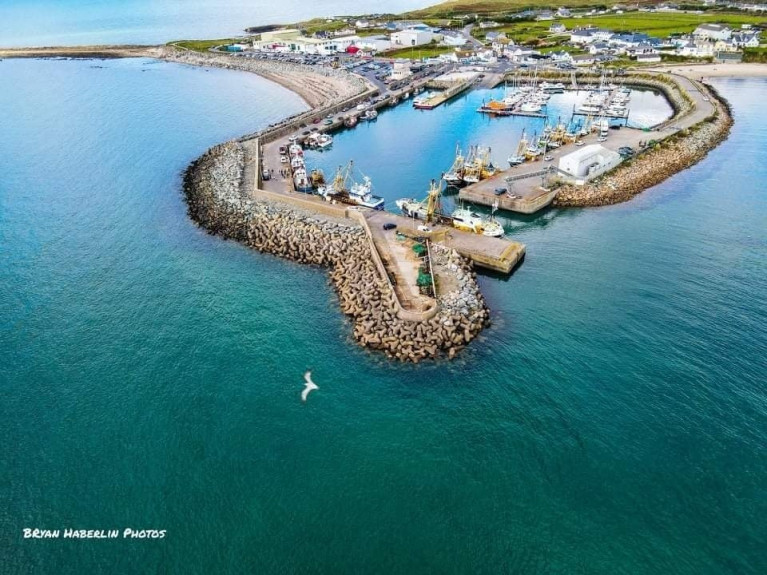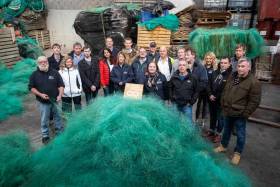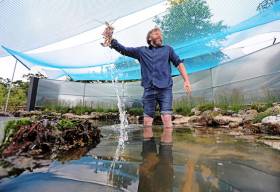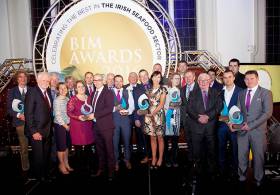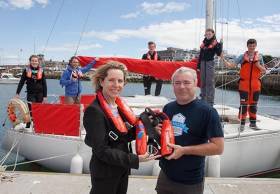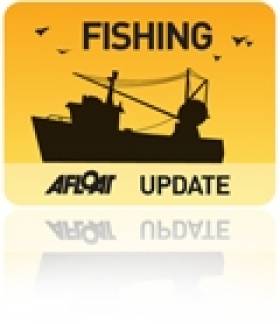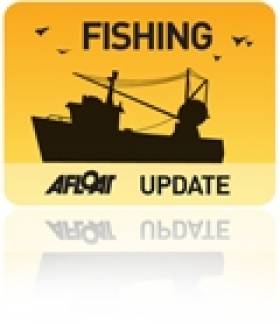Displaying items by tag: Bord Iascaigh Mhara
Serious Situation for Irish Fishing Fleet Reported by State Fisheries Board
Bord Iascaigh Mhara has confirmed the serious economic situation for the Irish fishing industry. In its annual report, the State fisheries board says there will be a decrease in landings, revenue and profitability.
It says, "In the long-term, decommissioning will help bring fleet capacity back in balance with available quotas and improve the profitability for vessels remaining in the Irish fleet.”
This, however, is disputed by the fishing industry representative organisations, which contradicts the BIM conclusion. They say that hundreds of jobs will be lost, damaging the industry, making it unattractive to new entrants and ultimately creating serious economic and social problems in the country’s coastal communities.
Acknowledging the problems for the fishing fleet due to fuel prices, where the Marine Minister has refused requests for a subsidy, which would be similar to other EU countries, BIM says: “Based on feedback from industry, the impact of the Russian invasion of the Ukraine on inflation and rising fuel costs was the main driving force influencing the economic performance of the Irish fleet in 2022. In 2020, average fuel costs per litre were €0.42 whereas average fuels costs per litre in mid-2022 stood at €0.90, representing a 114% increase in cost and the current reported costs of €1.20 per litre represents a 18% increase since 2020.”
 An illustration from the 2022 BIM Annual Fisheries Report 2022
An illustration from the 2022 BIM Annual Fisheries Report 2022
The report, for 2021, says that the data indicates an increase in landings by weight from 2020 (+6%) and a decrease in value of landings (-7.5%) due to decreasing fish prices and changes in quota allocation. Gross profit for 2021 is projected to decrease significantly (-58%) to €27.6 million combined with a decreasing net profit (-75%) to €8.1 million.
“In terms of the outlook for economic performance for 2021-2022, preliminary data point to a decrease in revenue and profitability for the Irish fleet. It also records less time spent at sea by the country’s fishing boats: “The Irish fishing fleet spent 77,460 days at sea, of which 84% were fishing days representing a decrease of 16% and 17% respectively from 2019.
“For 2021, the data indicates an increase in landings by weight from 2020 (+6%) and a decrease in value of landings (-7.5%) due to decreasing fish prices and changes in quota allocation. Gross profit for 2021 is projected to decrease significantly (-58%) to €27.6 million combined with a decreasing net profit (-75%) to €8.1 million.
“Profitability of the Irish fleet has increased since 2019, however, it says. Revenue increased by 2%, amounting to €312 million; gross value added (GVA) €161 million (+6%), gross profit €65 million (+24%) and net profit decreased to €32 million (-20%) due in part to Covid-19. The fleet landed over 218,600 tonnes valued at €312 million, an increase of 5% from 2019 in live weight and an increase of 2% in landed value (€306.5 million). In 2021, the fleet landed 233,000 tonnes, an increase of 7% from 2020.
Overall, the cost structure of the fleet has remained stable with a slight increase in all costs except non-variable costs (e.g., insurance, loan interest). Operating costs totalled €255 million, a slight increase of 1% from 2019 with energy costs increased by approximately 10%. When capital costs are included, the total cost of operating the national fleet rose by 4% since 2019 to €278.5 million.
Direct employment generated by the sector was estimated at 2,928 jobs corresponding to 2,684 full-time equivalents (FTEs).
Marine Minister Welcomes State Aid Approval for Post-Brexit Voluntary Decommissioning Scheme for Whitefish Fleet
Marine Minister Charlie McConalogue today (Thursday 28 July) welcomed State Aid approval to facilitate the implementation of the voluntary decommissioning scheme for the whitefish fishing fleet recommended by last October’s Report of the Seafood Task Force – Navigating Change.
Reacting to the approval decision by the EU Commission, Minister McConalogue said: “The Seafood Task Force, which included representatives of the five fisheries producer organisations and the four main fisheries cooperatives, recommended in its October 2021 report that a voluntary decommissioning scheme should be implemented to help restore balance between fishing fleet capacity and available quotas, following the reductions in quotas for stocks arising from the EU/UK Trade and Cooperation Agreement.
“I have ensured that the dimensions of the scheme will follow the recommendations of the task force. The task force considered that a scheme targeting the voluntary decommissioning of vessels with total capacity of up to 8,000 gross tonnes and 21,000 kilowatts could restore the viability of the remaining fleet.
“Today’s decision makes way for implementing this key recommendation of the task force which will offer vessel owners a premium of up to €12,000 per gross tonne. This will comprise a basic premium of €3,600 per gross tonne and a catch incentive premium of up to €8,400.
“The catch incentive premium paid will reflect the TCA quota stocks catch history of the vessel applying, ensuring that the scheme is most attractive to active vessels, whose voluntary departure from the fleet can contribute most to rebalancing the remaining fleet with the reduced quota available.”
The minister added: “In line with the recommendations of the task force I am also requiring that owners of vessels who choose to participate in the scheme must ensure that crew working on their vessel are compensated for their loss of livelihood following the decommissioning of their vessel.”
The scheme provides for a payment by the vessel owner to the crew member for each year of service in the fleet, up to a maximum of €50,000 for a crew member who had worked in the fleet for 40 years.
The Seafood Task Force recommended that in order to achieve the objective of improving the viability of the fleet within available fishing quotas post Brexit a package of tax measures be put in place to support vessel owners who choose to apply to leave the fleet under what is a voluntary exit scheme.
The tax measures recommended by the Seafood Task Force in relation to payments under the scheme were enacted on 2 June 2022 through section 15 of the Finance (Covid-19 and Miscellaneous Provisions) Act 2022, which provide for beneficial treatment of the scheme payments with regard to capital gains and income tax with potential benefit up to €20 million.
Minister McConalogue concluded: “This scheme flows directly from the recommendations of the Seafood Task Force. I have asked BIM to ensure that the scheme will allow for an adequate period of time for vessel owners to reflect before making what are important decisions in relation to whether or not they wish to avail of the scheme.
“The overall package of measures that are being implemented on foot of the Seafood Taskforce Recommendations will contribute to the long-term viability of the fishing fleet, the wider seafood sector and the coastal communities dependent upon it.”
The scheme will be administered by Bord Iascaigh Mhara (BIM) which will publish full technical details and open the scheme in a matter of weeks. A fund of up to €60 million in direct payments is available to deliver the voluntary scheme.
Further details of the scheme will be available from bim.ie/fisheries/funding/.
Aquabusiness Course Offers Big Future for Graduates
Graduates from Wexford Campus' Aquabusiness course have celebrated the completion of their studies.
As the Wexford People highlighted, this is the only course of its kind in the country, as the Higher Diploma in Business in Aquabusiness is now in its fourth year and continues to be popular among young candidates.
'The 2019/2020 cohort graduated with a virtual ceremony,' said lecturer Amy Allen. 'Covid-19 impacted their second semester quite significantly in that a number were scheduled to start industrial placement and of course lockdown restrictions did not permit this.
'However, the course is flexible and, as a teaching team, we feel we are very flexible and responsive to the sector's situation, so we managed to transfer some of these students onto an interdisciplinary project (desk-based).
'Those who really want to complete the placement are being put on hold until restrictions ease and they can rejoin their sponsor companies.'
Among those graduating were three students from Wexford, and others from as far afield as Cork, Galway and Donegal.
'These guys are from the farmed fishing sector, some are also from Bord Iascaigh Mhara (BIM) and work as marine biologists,' Ms Allen said.
More here from the newspaper.
Afloat adds according to BIM's website, the course is designed to cater for those looking to enter management, financial, research & development or regulatory roles in fisheries, aquaculture, seafood processing and related fields
BIM Focus on Smart Net Management at Castletownbere Workshop
Bord Iascaigh Mhara (BIM), Ireland’s seafood development agency, and the Irish South and West Fishermen’s Producers Organisation (ISWFPO) co-hosted a net management workshop in Castletownbere, West Cork this month. The aim of the day-long event, attended by a cross -section of the Irish seafood sector and auxiliary industries, was to track the ‘journey’ of fishing gear from its initial entry into the market to its end of life or ‘retirement’. The workshop also looked at ways to better analyse and understand the source of marine litter brought ashore by the Irish catching fleet today.
New plastics and circular economy polices underpin emerging trends in sustainability. They require member states to minimise the impact of plastics on the environment and to increase the opportunities for used plastics to be recycled and retained instead of ending up on a landfill.
As of October 2019, a total of 224 fishing vessels are registered to Fishing For Litter (FFL). The national programme, where fishing vessels voluntarily collect and take ashore all marine litter they collect during normal fishing activities at sea, forms part of the wider Clean Oceans Initiative. The application of circular economy principles is key to the new national initiative to reduce marine waste so that fishing vessels can develop new ways to record, log and make an inventory of gear and marine waste. To date, 49 vessels are registered to Fishing for Litter in the port of Castletownbere. This represents one fifth of the national fleet.
“The local determination to demonstrate their fishing gear management is outstanding. Other key stakeholders such as the harbour management, net makers are also behind the objective and are keen to help communicate and validate the responsible approach taken by the large majority in Castletownbere”, said Patrick Murphy, CEO, ISWFPO.
The EU Commission is currently developing new ways to monitor and report fishing gear, from being placed on the market to its retirement. The Commission is also exploring ways to better analyse marine litter. The final report will be available in July 2020.
BIM’s establishment of the Fishing for Litter programme in 2015, supported by the European Maritime and Fisheries Fund, has given Ireland a head start. The state agency for the development of the seafood sector is also working on ways to improve the characterisation of waste and marine litter. Progress in this area will ultimately lead to stronger insights about marine waste. BIM has also been handling end of life gear aspects since 2006. However, the new EU directives and polices on plastics will give a new impetus to addressing end of life gear.
“Demonstrating the responsible management of our gear at its end of life is a priority. A full trawl gear could have up to a 10-year life span and is an expensive key piece of equipment. We are keen to work with BIM to identify how best to monitor and record our gear efficiently and to demonstrate this objectively”, explained ISWFPO chairman, Damien Turner.
In September 2015, the General Assembly of the United Nations adopted the 2030 Agenda for Sustainable Development. It comprises 17 Sustainable Development Goals (SDGs). BIM was recently appointed an SDG champion for four of the goals, two of which are particularly relevant where plastics and marine waste are concerned; SDG 14( Life Below Water; a target of which is to help prevent and reduce marine pollution) and SDG12( application of environmentally sound management of all waste through their life cycle).
“The aim of the Champions programme is to raise awareness of the SDGs and to show through the example of the Champions that everyone in society can make a contribution to achieving the 17 Goals. The catching sector is a key contributor to ensuring that we can improve the outcomes for Life Below Water and maximise the lifecycle and recoverable costs of plastics used by the catching sector, the Clean Oceans Initiative will be instrumental in delivering on these SDGs ”, explained Catherine Barrett, BIM.
Representatives from two EU funded projects, ‘Blue Circular Economy’ and ‘Circular Seas’, tasked with creating opportunities for end of life fishing gear, also attended the workshop in Castletownbere.
Bord Iascaigh Mhara Underwater Garden Unveiled at Bloom
Bord Iascaigh Mhara (BIM), Ireland’s seafood development agency, today (May 29th) unveiled the first ever underwater garden to appear at Bloom. The marine garden, Aquamarine, supported by the European Maritime and Fisheries Fund, is brimming with sea life from different types of seaweeds to fish species native to Irish waters and highlights the need to protect our marine environment against plastic waste.
“ Ireland is an island nation. We’re surrounded by water and almost half of us live 5km or less to the coastline. We need to work together to protect this precious resource. Sustainability must underpin our actions. Bord Iascaigh Mhara is proud to be leading a number of key projects with women and men in the fishing and wider seafood sector to reduce and reuse plastic from our marine environment and to stop it from getting there in the first place.”
As Afloat previously reported, the marine garden resembles a giant rockpool and has a fishing net suspended over it to demonstrate the active role the fishing and wider seafood sector in Ireland are taking to reduce plastics in our seas.
BIM has been tasked to have every Irish registered fishing trawler participating in its Fishing for Litter scheme under the major new national Clean Oceans Initiative by the end of 2019. Fishing for Litter is an entirely voluntary scheme that involves fishermen collecting plastics and any other waste they haul up in their nets when out fishing and taking it ashore. BIM then works with harbour masters to manage the waste that is collected and recycled or disposed of in a responsible way.
Fishing for Litter currently operates in 12 of Ireland’s main fishing ports. To date, more than 330 tonnes of marine waste has been collected by fishermen participating in the scheme.
The garden, designed by Oliver and Liat Shurmann, of Mount Venus nurseries contains 27,000 cubic metres of sea water. All of the materials used in the garden have been salvaged or recycled and will be reused after the event.
Oliver Shurmann spoke of the inspiration behind the garden and said:
“We thought we could take a cross section of a marine landscape, say a rockpool, and highlight that as something so incredibly valuable, clean and undisturbed hence the name of the garden Aqua Marine”
Aquamarine is open to visitors each day of Bloom from Thursday 30th May until Monday 3rd June. A video that tells the story of the inspiration behind the marine garden can be watched here.
Bord Iascaigh Mhara Announce Winners of Inaugural National Seafood Awards
Bord Iascaigh Mhara (BIM), Ireland’s Seafood Development Agency, announced the winners of the first ever BIM National Seafood Awards held on Thursday 17th November 2016 at a Gala Awards event in the Clayton Hotel, Ballsbridge, Dublin.
Out of 38 finalists shortlisted across the areas of Skills, Sustainability, Innovation and Competitiveness, twelve winners received awards for their outstanding contributions to the fishing, fish farming, seafood processing and retail sectors at a ceremony officially opened by Minister for Agriculture, Food and the Marine, Mr. Michael Creed, T.D.
BIM’s CEO Tara McCarthy outlined the rationale behind the awards; ‘The Irish Seafood Sector contributes €1 billion in GDP to our economy and employs over 11,000 people predominantly in our coastal regions. The BIM National Seafood Awards provide us with the opportunity to celebrate the positive contribution of this valuable indigenous industry and recognize excellence and leadership across this diverse sector. It is an exciting time to work in seafood and the high standard demonstrated by our winners and all of our finalists bodes well for the future as we collectively aim to achieve growth as set out in the Government’s Food Wise 2025 plan’
The winners represent a wide geographical spread including three from Donegal; two each are from Cork and Dublin while Kerry, Kilkenny, Louth, Mayo, Waterford and Wexford each had one winner on the night.
Included in the list of winners are two talented young fishmongers; Stephen Hurley from The Fish Shop, Union Hall, Co. Cork and Eimantas Zvirblis from Donnybrook Fair, Malahide, Co. Dublin who have won the coveted title of BIM Young Fishmonger of the Year (Independent Seafood Specialist) and (Supermarket Seafood Counter).
The full list of winners from the first ever BIM National Seafood Awards are:
Category: Skills
· Student of the Year: Barry Shaw (Killybegs, Co. Donegal)
· Young Fishmonger of the Year (Independent Seafood Specialist): Stephen Hurley, The Fish Shop, Glenmar Shellfish, Union Hall, West Cork
· Young Fishmonger of the Year (Supermarket Seafood Counter): Eimantas Zvirblis, Donnybrook Fair, Malahide, Co. Dublin
Category: Sustainability
· Responsible Fisherman of the Year: Jim Connolly, Supreme II, Clogherhead. Co. Louth
· Aquaculture Environmental & Social Responsibility Award: Blackshell Farm, Newport, Co. Mayo
· Green Processor of the Year: Island Seafoods Ltd, Killybegs, Co. Donegal
Category: Innovation
· Best New Fishing Practice: Foyle Warrior Ltd, Greencastle, Co. Donegal
· Innovation in Aquaculture: Dungarvan Shellfish Ltd, Dungarvan, Co. Waterford
· Innovation in Seafood Processing: Oceanpath/Dunn’s of Dublin (Howth, Co. Dublin) & Goatsbridge Trout Farm (Thomastown, Co. Kilkenny)
Category: Competitiveness:
· Fishing Enterprise of the Year: DC Fish Ltd (Union Hall, Cork)
· Aquaculture Enterprise of the Year: Kush Seafarms Ltd, Kenmare, Co. Kerry
· Seafood Enterprise of the Year: Sofrimar, Kilmore Quay, Co. Wexford
Establishing leaders in the sector is a key priority for BIM and the final award of the evening, the BIM Lifetime Achievement Award, was presented to the family of a true leader in his field, the late Mr. Martin Howley, as BIM Chairman Kieran Calnan explains; ‘Martin exemplified everything you need to be a great leader. He led by example starting as a fisherman in Killybegs in the 1970’s rising to become a pioneering mackerel Skipper then a successful businessman and a great leader in the fishing industry. His passion, energy and innovative spirit were a unifying and driving force. Martin is a most worthy recipient of the BIM Lifetime Achievement Award’
BIM also introduced an exciting new brand identity to Industry at the event. Grounded in BIM’s plans to enable progress in the seafood sector under its four key priorities – Skills, Sustainability, Innovation and Competitiveness, this fresh and vibrant new look for one of Ireland’s longest established state agencies, is consistent with its vision for ‘Ireland to become the International leader in high value differentiated seafood products that satisfy growing domestic and international demand for nutritious, safe and responsibly and sustainably produced food’.
Details on BIM National Seafood Award 2016 winners:
SKILLS
Student of the Year - Barry Shaw, Killybegs, Co. Donegal
Barry Shaw is from Corkermore, Killybegs, Co. Donegal. He has completed his ‘Class 3 Certificate in Competency in Engineering’ at the National Fisheries College, Greencastle and is now serving his sea time on board a fishing vessel. Prior to the course Barry was serving his apprenticeship as a refrigeration engineer. He was always interested in fishing vessels so decided to further his career and knowledge of engines by doing the course at Greencastle. He loves doing his sea time on board the vessel “Ocean Fresh” and is just back from a trip off the coast of Africa. He said the travelling is fascinating as he is seeing parts of the world he has never seen before.
BIM Young Fishmonger of the Year:
a. Independent Seafood Specialist - Stephen Hurley
Stephen has worked at Glenmar Shellfish/The Fish Shop in Union Hall, Co. Cork for the past 10 years and lives overlooking Union Hall pier in West Cork. Stephen’s interest in the sea began as a young boy and, as a teenager, he became a crew man on a shrimp boat hauling shrimp pots every morning with his neighbour. Stephen prides himself on stocking locally caught fish and shellfish in store. On any given day he has upwards of 25 different species of fish and shellfish. He is in a unique position as he is on first name terms with the skippers and crews and can tell a customer exactly where their fish was caught and by who. www.glenmarshellfish.com/
b. Supermarket Seafood Specialist - Eimantas Zvirblis
Eimantas Zvirblis works in Donnybrook Fair’s flagship store in Malahide which opened last Christmas. His passion in life is fish and realised he had a skill in this area when working for the Dublin Smoked Fish company in 2010. He also previously worked in Nicky’s Plaice in Howth, where he developed his customer service skills.
Donnybrook Fair has a large range of seafood on its counter including whole fish, fillets, shellfish, smoked fish, marinade fish, and ready-to-cook fish. Eimanatas particularly enjoys sharing fish recipes with his customers. He believes in his product and eats fish seven days a week. ‘Many of my colleagues in Donnybrook Fair are now eating more fish and many customers are telling me that they are eating more fish too. I believe that spreading this passion is a very important part of being a fishmonger’, Eimantas says. www.donnybrookfair.ie/Malahide
SUSTAINABILITY
Responsible Fisherman of the Year - Jim Connolly, Supreme II
Jim Connolly owns and skippers the “MFV Supreme II” which is based at Clogherhead, Co. Louth. He is a board member of Clogherhead Fishermans Co-Op and has been pro-active in undertaking a number of sustainability initiatives to deliver on targets for the Bord Bia Origin Green programme. The “MFV Supreme II” was one of the first vessels to sign up for BIM’s Fishing for Litter trial and Jim participated in a radio documentary, “Fishing for Litter”. He also participates in BIM’s net recycling programme and works closely with Clogherhead Development Group on recycling.
“MFV Supreme II” has its crew welfare as a priority. Jim is committed to the safety and comfort of his crew and the crew s of his fellow vessels in the Clogherhead fleet. He has been instrumental in putting a Co-Op fork lift in other ports where the Co-Op fleet works to assist crews with heavy lifting tasks. He is monitoring the vessel’s fuel efficiency. Jim also organised and designed stretching posts in the hall on the pier to ensure the gear is “weighted” for fuel efficiency – this also reduces the need for excessive use of fork lifts.
Aquaculture, Environmental and Social Responsibility Award - Blackshell Farm
Blackshell Farm is based in Westport, Co. Mayo and has been producing certified organic rope-grown mussels since 1983. They run a marine cargo service servicing the west coast of Ireland and also produce knitted mussel cotton. Blackshell uses only biodegradable and reusable materials to grow their mussels. Director Michael Mulloy is the current Chair of the Irish Shellfish Association, is a director of Clew Bay Oyster Co-Op (since 1988) and is a member of the Clew Bay CLAMS (Co-ordinated Local Aquaculture Management Scheme) group. He also has been a member of a national committee established by BIM to create a mussel quality scheme. Blackshell is certified by Organic Trust Ltd as an organic mussel grower, conforms rigidly to national sampling and monitoring programmes operated by the Marine Institute and the SFPA. They also participated in the ECOpact initiative run by BIM. Blackshell commissioned and expanded a knitting plant in Westport for biodegradable mussel stocking. They continually seek to achieve maximum return from the mussel biomass on their growing sites by ensuring they have optimum density of mussels on the rope. Blackshell monitor fuel usage closely and calculated that only 1 litre of fuel is required to produce 95kg of market size mussels. All product is delivered by sea to the onshore processing plant, eliminating the need for heavy goods vehicle movements on narrow local roads. www.blackshell.ie
Green Processor of the Year - Island Seafoods Ltd
Island Seafoods is a family-owned and run business based just outside Killybegs, Co. Donegal. A verified member of Bord Bia’s Origin Green programme, their fish are fully traceable from “net to fork” and are caught in the North East Atlantic. Island Seafoods was the first company in Ireland to be RSS (Responsibly Sourced Standard) certified by BIM. Managing Director, Mick O’Donnell has been responsible for and integral in driving the green initiative within Island Seafoods. The company has a “squeaky clean carbon footprint” they say as they have their own Hydro-electric plant which saves over 350 tonnes of greenhouse gases a year. They are also moving into wind energy.
Their state-of-the-art waste water treatment plant was commissioned in 1996 and is now seen as the standard for the industry. They also treat wastewater for other businesses in the area. In recent years, they have focused on improving efficiencies within the plant and their Green Team meet regularly to progress this. Energy is managed as a Key Performance Indicator (KPI). Island Seafoods is certified organic by Bio Suisse and Naturland. www.islandseafoodsltd.ie
INNOVATION
Innovation in Aquaculture – Dungarvan Shellfish Ltd
Dungarvan Shellfish is owned by the Harty Family in Dungarvan. an oyster farm producing up to 500 tonnes of Gigas oysters each year. The company buys 20 million oyster seed per year which is usually purchased from hatcheries in France at 6mm. This seed however was suffering a high level of mortality (up to 50%) and it was difficult to get it at the right size and time needed.
To overcome these problems Dungarvan Shellfish set up their own nursery. They started importing seed at 1.5mm instead of 6mm and growing it up to 8mm within only six weeks. After two years of using this new method mortality rates are down 15% and the shape of the oyster has improved.
The cost of buying smaller seed is considerably cheaper. The nursery system that Dungarvan Shellfish has installed is very economical to run and profits have increased considerably. The company plans to make the nursery self-sufficient in seed input and to be in a position to supply other producers with excess seed stock. www.hartyoysters.com
Best New Fishing Practice Award - Foyle Warrior Ltd
Foyle Warrior, based in Greencastle, Co. Donegal, has introduced new mesh netting on its vessel the Foyle Fisher, in a mixed demersal fishery in the Celtic Sea. The introduction of the new T90 mesh has resulted in major reductions in catches of undersize whiting therefore complying with new regulations. Traditionally the Foyle Fisher was using 80mm diamond mesh netting when targeting whiting. The new T90 comprises diamond mesh rotated 90 degrees which results in increased mesh openings in the cod-end. This has reduced catches of below market size by 60%. The quality of the catch is also greatly improved and the crew has to spend less time picking and sorting the catch.
Less time spent handling the catch means more time fishing and greater profitability. Substantial improvements in fish quality also add value to the catch.
Foyle Warrior say the cost of introducing T90 was low and can therefore be adopted by the industry. The company is constantly looking for new ways to catch the right sort of fish and improve the quality of the catch.
Innovation in Seafood Processing: Oceanpath Dunn’s of Dublin and Goatsbridge Trout
The innovation was a coming together of Oceanpath Dunn’s of Dublin a seafood processor, with Goatsbridge Trout, a trout farmer, to develop the market for Irish Trout in Ireland. Both companies saw an opportunity to develop sales for trout in a seafood market that was dominated by salmon.
The initial innovation was developing a fixed weight boneless trout fillet for sale on fish counters. Following on from this both companies realised there was an opportunity to develop ready to eat trout products. The first product developed was a cold smoked trout which is now available in all major retailers and is generating retail sales of approximately €400k per annum.
Following on from the success of this product a bbq trout and smoked trout pate were launched. The trout pate has been a fantastic success adding €100k worth of retail sales. Goatsbridge is now a well known brand in seafood and has grown sales of Irish trout significantly. The products have also won Great Taste Awards and Blas na hEireann awards. www.oceanpath.ie
COMPETITIVENESS
Seafood Enterprise/Entrepreneur of the Year -Lorcan Barden & Leslie Bates, Sofrimar Ltd
Lorcan Barden and fellow director, Leslie Bates acquired Sofrimar in 2,000 via a management buyout. Both directors are very strongly committed to ongoing education, upskilling and training for themselves and their staff. Sofrimar invests heavily in the best available technology for the seafood sector and this, combined with a strong focus on staff development, new product development, market expansion and operational excellence has seen a strong growth in turnover, profitability and employment for the company.
A member of Bord Bia’s Origin Green programme, Sofrimar’s commitment to sustainability was recognised earlier this year when it won the “Green Seafood Business Award”. Sofrimar supports co-opetition and worked in partnership with other seafood companies to access international markets including China (where they opened an office in Shanghai), Hong Kong, Taiwan, Spain and Portugal. Sofrimar employs 134 people and has increased both turnover and employee numbers threefold since 2009. www.sofrimar.ie
Fishing Enterprise of the Year - DC Fish Ltd
DC Fish is owned and managed by the Deasy family who operate a successful seafood business model that offers a ‘frozen at sea’ product range to domestic retail and export driven wholesale seafood business. The company employs nine staff and has an annual turnover of over €1.8 million.
A significant but focused investment in facilities by DC Fish in recent years enabled under-utilised whitefish product to be frozen at sea and supplied to a developing and growing domestic market. In addition, frozen prawn products were tailored to the domestic retail and food service market. The company was one of the early adopters of the ‘frozen at sea’ method and have proven that there is significant scope to improve the profitability in both the catching and processing sectors via this process.
DC Fish has formed a partnership with a local businessman and opened a fish retail premises in nearby Rosscarbery – Fish Seafood Deli. The business employs 11 full-time staff and 10 part-time staff and has gone from being a retail operation to selling fresh directly to hotels and restaurants and from two mobile units. The company has also developed a range of seafood products which they launched into 20 Super Valu stores in recent months. www.dcfish.net
Aquaculture Enterprise of the Year Award - Kush Seafarms Ltd
Kush Seafarms was established in June 1987 and is a family-run business based in Kenmare, Co. Kerry. It is Ireland's first organise rope mussels producer and specialises in the export of shellfish globally with particular emphasis on Europe.
The lack of a functioning licensing system and dependence on the commodity outlets for its products meant that Kush struggled to find growth in the sector. In 2009 they devised a new strategy based on innovation, value-added and partnerships. In June of the same year, Kush was the first Irish company to secure organic certification. They then, uniquely for the sector, approached the rope mussel processing sector vis-à-vis outsourcing. In 2010, working with Carr Shellfish Ireland, they launched an organic vacuum pack mussel at Biofach (the world’s leading trade fair for organic food). Contracts with companies in Switzerland and France followed and they are currently working on the US market. Kush decided there was potential in the premium rope mussel IQF meat product and agreed an outsourcing arrangement in Holland in 2011. Despite the growth, employment figures have remained stable thanks to increased mechanisation and the company is profitable.
www.kush.ie
LIFETIME ACHIEVEMENT AWARD – MARTIN HOWLEY
Martin Howley was born in Castleconnor on the Mayo/Sligo border in 1952. At 17, his school had a visit from BIM as part of a promotional campaign to recruit young men to the fishing industry. Martin immediately set off for Killybegs to begin his career. In the course of his apprenticeship Martin fished on several boats and in 1980 he joined Skipper John Bach as Mate on the MFV Western Viking, Killybegs Fishing Enterprise’s first RSW vessel. In 1981 Martin graduated to Skipper when the company purchased the MFV Jasper Sea and so began the phenomenally successful partnership of these two vessels and their skippers. In recent years Martin was joint owner of MFV Atlantic Challenge along with other vessels.
Martin was a board member of the Killybegs Fishermen’s Organisation since it was founded in 1979 and became a well-known figure in Brussels where he fought unswervingly for all Irish fishermen. His final project as KFO member was his involvement in the setting up the Bio-Marine Ingredients Ireland plant in Killybegs. This work is ongoing and is a perfect example of the broad vision of a man who could see the benefits of combining the health supplement industry with a fisheries product
Bord Iascaigh Mhara Promote Safety at Sea to Young Sailors from the Irish Youth Sailing Club
Bord Iascaigh Mhara (BIM), the Irish Sea Fisheries Board were delighted to present the Irish Youth Sailing Club with a set of compact Personal Flotation Devices (PFDs) on Monday 11th July at the West Pier, Dun Laoghaire.
Building on BIM’s recent ‘Live to Tell the Tale – Always Wear your Lifejacket’ campaign aimed at increasing awareness for safety at sea for the commercial fishing sector; the agency is also keen to promote safety to our young people as Tara McCarthy, BIM CEO explains; ‘Safety at Sea is a key priority for BIM and our commercial fishing sector. We at BIM want it to be a priority for all who go to sea. Partnering with the Irish Youth Sailing Club and their Principle Kyron O’Gorman, I am delighted to be here today to present eight of the latest compact lifejackets to a young crew and their Skipper Eugeen McCann. Instilling a safety at sea culture from a young age will help to save lives now and into the future. Education and awareness is key and the inclusion of personal locator beacons in these lifejackets will enable the emergency services to locate a person overboard in a matter of minutes. Congratulations to Kyron and his team, they have trained and encouraged many young people to learn a valuable skill and this investment will result in talented safety focused mariners in the future’
Irish Youth Sailing Club was set up by Kyron O’Gorman for children from 10 years old from non sailing backgrounds. The club is running for 30 years and provides children with basic training in sailing, powerboating, kayaking and VHF, First Aid and Navigation.
The club was recently presented with a Yacht and in partnership with Gearoid O’Rinn from the Sea Scouts, the new Venture Yacht will open the door to older teenage members with further training including a Day Skipper or Yacht Master qualification.
Kyron O’Gorman, Principle of Irish Youth Sailing Club and Officer in Charge in the Irish Coast Guard from Dublin to Bray expressed his gratitude to BIM and local supporters; ‘Thanks to the incredible support from BIM, private Sailors and our Commercial marine sector, we now have a programme in place that is a step up for our more senior teenagers. We are delighted to have the best PFD’s currently available on the market and along with BIM safety training for our crew, we will be fully prepared for our new venture at sea’
Irish Fisheries Chief Wants To Create A Taboo About Lifejackets
Tara McCarthy has a magnificent view out of her office windows.
“You could look out there all day,” she says as we chat in the office on Crofton Road in Dun Laoghaire, looking out on Dublin Bay. Even on a damp January afternoon it is a great vista as a ship heads out of Dublin Port into what it seems will be a harsh enough time ahead at sea. However, it is not the view we have met to discuss, but whether a taboo can be created around a troubling issue – safety at sea and those who will not wear lifejackets.
Tara McCarthy is Chief Executive of Bord Iascaigh Mhara, the State fisheries board, which has launched a campaign to persuade fishermen that they must wear lifejackets. There has been an attitude amongst them that it was better not to wear one. If a fisherman fell into the sea from the boat, it was likely that the sea would take him, so it was better not to struggle to live.
That was the attitude, about which a taboo would be in place if Tara McCarthy has her way.
The statistics are frightening. Fishing is thirteen times more dangerous than the construction industry. Over the last ten years 53 fishermen have lost their lives at sea. BIM research showed that quite a number of fishermen knew colleagues who died at sea but many of those fishermen, even though they knew a colleague who had died in a tragedy, would still not wear a lifejacket.
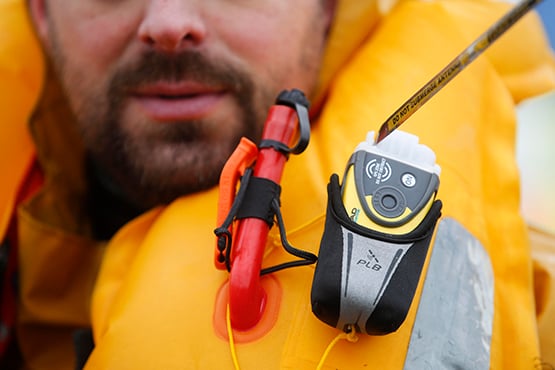
The new BIM lifejacket with built-in position finder
That shocked me and so it did the CEO also, which is why the lifejackets campaign is tough, hard-hitting.
“Those fishermen should realise the impact they could have on their families by a decision not to wear a lifejacket. It is, perhaps, shocking to face them with that realisation but we have launched a campaign that is deliberately hard-hitting campaign. “It is not soft, just saying that it would be nice to wear a lifejacket. We are facing fishermen with a life-impacting decision. We talked to fishermen about this and they told us to make it hard-hitting and that is what we are doing.”
• Listen to the BIM CEO on the programme above
#FishFarm - Bord Iascaigh Mhara (BIM) has responded to concerns from environmental groups that an ingredient in treatments for sea lice in salmon farms poses a threat to wild marine life.
As Galway Bay FM reports, campaigners Galway Bay Against Salmon Cages - one of the groups opposed to the planned Galway Bay fish farm - say that cypermethrin, an active ingredient in veterinary medicine used to treat sea lice, is toxic to aquatic organisms.
BIM aquaculture manager Donal Maguire attempted to play down fears over the use of the pesticide, saying it has been fully tested for toxicology in the marine environment.
However, another campaign group claims BIM's position is contrary to the manufacturer's own warnings on the use of the drug.
According to FishNews.eu, Friends of the Irish Environment (FIE) cited the Irish Medicines Board's product description for cypermethrin, which states that it is "dangerous to fish and other aquatic life" and demands that the chemical "should not be allowed to contaminate water".
FIE went on to describe cypermethrin as "a biocide which kills life, not a medicine that saves lives" and as "a highly active neurotoxin" with "known effects on fish and, most sensitive of all, crustaceans such as crabs and lobsters. Bathers and watersports [enthusiasts] may also be at risk."
Earlier this month, Inland Fisheries Ireland (IFI) expressed "serious concerns" over the findings of a study on wild salmon in Ireland that claimed fish farm schemes were less harmful to wild fish than pollution and possibly even beneficial to wild catchments.
IFI is among the significant opposition to BIM's proposed organic salmon farm off the Aran Islands, a 500-hectare project that would be the largest of its kind in Europe and create hundreds of jobs in the locality.
#Fishing - The Irish Times reports that Inland Fisheries Ireland (IFI) has expressed "serious concerns" over the findings of a new study on wild salmon in Ireland.
The State agency for Ireland's fisheries argues that the study - which concluded not only that pollution has a greater impact on wild salmon numbers than fish farming, but also that salmon catchments in close proximity to aquaculture schemes were some of the best performing - is based on flawed methodology.
IFI is among the chorus of voices opposed to the planned organic salmon farm off the Aran Islands in Galway Bay - a 500-hectare project by Bord Iascaigh Mhara (BIM) that would be the largest of its kind in Europe if given the go-ahead.
Marine Minister Simon Coveney recently attempted to alleviate concerns over the controversial scheme, claiming there would be no damage to the environment or fish stocks.
However, the controversy doesn't end there, as last month celebrity chef and 'Slow Food' champion Darina Allen wrote to the minister over erroneous claims in BIM's environmental impact statement (EIS) for the project.
As reported by the Galway Independent, Allen contacted Minister Coveney to clarify that the Slow Food movement does not support fish farming projects, after references to the initiative in the EIS "seemed to create a lot of confusion".
Allen told the paper: “Many people contacted me under the perception that Slow Food endorsed the whole salmon farm thing and actually Slow Food has made no statement whatsoever on it.”
Later, Michèle Mesmain of Slow Food International confirmed that “salmon farming does not fit in any pillar of Slow Food”.
The Galway Independent has much more on the story HERE.


























